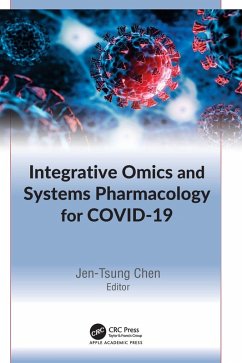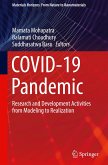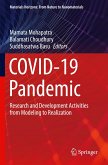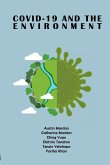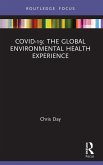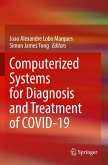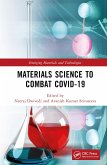Integrative Omics and Systems Pharmacology for COVID-19
Herausgeber: Chen, Jen-Tsung
Integrative Omics and Systems Pharmacology for COVID-19
Herausgeber: Chen, Jen-Tsung
- Gebundenes Buch
- Merkliste
- Auf die Merkliste
- Bewerten Bewerten
- Teilen
- Produkt teilen
- Produkterinnerung
- Produkterinnerung
Provides latest methods and applications of integrative omics and systems pharmacology for exploring treatments and medications for COVID-19. It presents a powerful way to discover drug candidates performed by systems/network pharmacology.
Andere Kunden interessierten sich auch für
![COVID-19 Pandemic COVID-19 Pandemic]() COVID-19 Pandemic113,99 €
COVID-19 Pandemic113,99 €![COVID-19 Pandemic COVID-19 Pandemic]() COVID-19 Pandemic113,99 €
COVID-19 Pandemic113,99 €![COVID-19 and Water in Asia and the Pacific COVID-19 and Water in Asia and the Pacific]() Asian Development BankCOVID-19 and Water in Asia and the Pacific39,99 €
Asian Development BankCOVID-19 and Water in Asia and the Pacific39,99 €![COVID-19 and the Environment COVID-19 and the Environment]() Austin MardonCOVID-19 and the Environment24,99 €
Austin MardonCOVID-19 and the Environment24,99 €![COVID-19 COVID-19]() Chris DayCOVID-1929,99 €
Chris DayCOVID-1929,99 €![Computerized Systems for Diagnosis and Treatment of COVID-19 Computerized Systems for Diagnosis and Treatment of COVID-19]() Computerized Systems for Diagnosis and Treatment of COVID-19138,99 €
Computerized Systems for Diagnosis and Treatment of COVID-19138,99 €![Materials Science to Combat COVID-19 Materials Science to Combat COVID-19]() Materials Science to Combat COVID-19140,99 €
Materials Science to Combat COVID-19140,99 €-
-
-
Provides latest methods and applications of integrative omics and systems pharmacology for exploring treatments and medications for COVID-19. It presents a powerful way to discover drug candidates performed by systems/network pharmacology.
Produktdetails
- Produktdetails
- Verlag: Apple Academic Press
- Seitenzahl: 458
- Erscheinungstermin: 18. November 2025
- Englisch
- Abmessung: 260mm x 183mm x 29mm
- Gewicht: 1050g
- ISBN-13: 9781998511204
- ISBN-10: 1998511200
- Artikelnr.: 75174557
- Herstellerkennzeichnung
- Libri GmbH
- Europaallee 1
- 36244 Bad Hersfeld
- gpsr@libri.de
- Verlag: Apple Academic Press
- Seitenzahl: 458
- Erscheinungstermin: 18. November 2025
- Englisch
- Abmessung: 260mm x 183mm x 29mm
- Gewicht: 1050g
- ISBN-13: 9781998511204
- ISBN-10: 1998511200
- Artikelnr.: 75174557
- Herstellerkennzeichnung
- Libri GmbH
- Europaallee 1
- 36244 Bad Hersfeld
- gpsr@libri.de
Jen-Tsung Chen, PhD, is a Professor of Cell Biology at the National University of Kaohsiung in Taiwan, where he teaches genomics, proteomics, plant physiology, and plant biotechnology. Dr. Chen's research interests include bioactive compounds, chromatography techniques, plant molecular biology, plant biotechnology, bioinformatics, and systems pharmacology. He is an active editor of academic books and journals in an effort to advance the exploration of multidisciplinary knowledge involving plant physiology, plant biotechnology, nanotechnology, ethnopharmacology, systems biology, and drug discovery. He serves as an editorial board member and a guest editor for several reputed journals. Dr. Chen has published books in collaboration with international publishers on diverse topics such as drug discovery, herbal medicine, medicinal biotechnology, nanotechnology, bioengineering, plant functional genomics, plant speed breeding, CRISPR-based plant genome editing, and artificial intelligence. He has been included in the list of the World's Top 2% Scientists 2023 by Stanford University.
1. An Overview of COVID
19: Highlighting the Impact of New Variants 2. Integrated Omics and Systems Pharmacology
Based Drug Discovery for COVID
19: An Overview 3. In Silico and Integrated Pharmacology Approaches for Developing Therapeutics for Treating Infectivity and Immunopathogenesis of SARS
CoV
2: An Overview 4. Exploring Natural Compounds and Traditional Herbal Medicines as Anti
SARS
CoV
2 Agents: Insights into Molecular Mechanisms and Systems Pharmacology Approaches 5. Network Pharmacology of Natural Compounds and Traditional Herbal Medicines for COVID
19 Treatment 6. Multi
Omics and Network Pharmacology Approaches for Unraveling Druggable Targets of Natural Products in COVID
19 Treatment 7. Multi
Omics and Artificial Intelligence
Based Therapeutic Screening of Plant
Derived Bioactive Products Against the SARS
CoV
2 Infection 8. Systems Pharmacology Approaches on the Anti
SARS
CoV
2 Activity of Natural Products 9. Multi
Omics Approaches in the Management of COVID
19: Drug Discovery and Diagnostic Strategies. 10. Omics Approaches for Anti
SARS
CoV
2 Drug Discovery 11. Protein Targets for the Anti
SARS
CoV
2 Activity of Natural Compounds 12. Molecular Mechanisms of RNA
Dependent RNA Polymerase Inhibitors Against COVID
19 from Natural Compounds 13. Molecular Mechanisms of Proteases 3CLpro and PLpro Inhibitors Against COVID
19 from Natural Compounds and Traditional Herbal Medicines 14. Molecular Mechanisms of Helicase Inhibitors Against COVID
19 from Natural Compounds 15. Flavonoids: Anti
SARS
CoV
2 Activity Against Protein Targets Revealed by Network Pharmacology 16. Natural Compounds of Aquatic Plants Against SARS
CoV
2: The Mode of Action 17. Application of Artificial Intelligence on COVID
19 Management and Its Impact on Drug Discovery and Computational Medicine.
19: Highlighting the Impact of New Variants 2. Integrated Omics and Systems Pharmacology
Based Drug Discovery for COVID
19: An Overview 3. In Silico and Integrated Pharmacology Approaches for Developing Therapeutics for Treating Infectivity and Immunopathogenesis of SARS
CoV
2: An Overview 4. Exploring Natural Compounds and Traditional Herbal Medicines as Anti
SARS
CoV
2 Agents: Insights into Molecular Mechanisms and Systems Pharmacology Approaches 5. Network Pharmacology of Natural Compounds and Traditional Herbal Medicines for COVID
19 Treatment 6. Multi
Omics and Network Pharmacology Approaches for Unraveling Druggable Targets of Natural Products in COVID
19 Treatment 7. Multi
Omics and Artificial Intelligence
Based Therapeutic Screening of Plant
Derived Bioactive Products Against the SARS
CoV
2 Infection 8. Systems Pharmacology Approaches on the Anti
SARS
CoV
2 Activity of Natural Products 9. Multi
Omics Approaches in the Management of COVID
19: Drug Discovery and Diagnostic Strategies. 10. Omics Approaches for Anti
SARS
CoV
2 Drug Discovery 11. Protein Targets for the Anti
SARS
CoV
2 Activity of Natural Compounds 12. Molecular Mechanisms of RNA
Dependent RNA Polymerase Inhibitors Against COVID
19 from Natural Compounds 13. Molecular Mechanisms of Proteases 3CLpro and PLpro Inhibitors Against COVID
19 from Natural Compounds and Traditional Herbal Medicines 14. Molecular Mechanisms of Helicase Inhibitors Against COVID
19 from Natural Compounds 15. Flavonoids: Anti
SARS
CoV
2 Activity Against Protein Targets Revealed by Network Pharmacology 16. Natural Compounds of Aquatic Plants Against SARS
CoV
2: The Mode of Action 17. Application of Artificial Intelligence on COVID
19 Management and Its Impact on Drug Discovery and Computational Medicine.
1. An Overview of COVID
19: Highlighting the Impact of New Variants 2. Integrated Omics and Systems Pharmacology
Based Drug Discovery for COVID
19: An Overview 3. In Silico and Integrated Pharmacology Approaches for Developing Therapeutics for Treating Infectivity and Immunopathogenesis of SARS
CoV
2: An Overview 4. Exploring Natural Compounds and Traditional Herbal Medicines as Anti
SARS
CoV
2 Agents: Insights into Molecular Mechanisms and Systems Pharmacology Approaches 5. Network Pharmacology of Natural Compounds and Traditional Herbal Medicines for COVID
19 Treatment 6. Multi
Omics and Network Pharmacology Approaches for Unraveling Druggable Targets of Natural Products in COVID
19 Treatment 7. Multi
Omics and Artificial Intelligence
Based Therapeutic Screening of Plant
Derived Bioactive Products Against the SARS
CoV
2 Infection 8. Systems Pharmacology Approaches on the Anti
SARS
CoV
2 Activity of Natural Products 9. Multi
Omics Approaches in the Management of COVID
19: Drug Discovery and Diagnostic Strategies. 10. Omics Approaches for Anti
SARS
CoV
2 Drug Discovery 11. Protein Targets for the Anti
SARS
CoV
2 Activity of Natural Compounds 12. Molecular Mechanisms of RNA
Dependent RNA Polymerase Inhibitors Against COVID
19 from Natural Compounds 13. Molecular Mechanisms of Proteases 3CLpro and PLpro Inhibitors Against COVID
19 from Natural Compounds and Traditional Herbal Medicines 14. Molecular Mechanisms of Helicase Inhibitors Against COVID
19 from Natural Compounds 15. Flavonoids: Anti
SARS
CoV
2 Activity Against Protein Targets Revealed by Network Pharmacology 16. Natural Compounds of Aquatic Plants Against SARS
CoV
2: The Mode of Action 17. Application of Artificial Intelligence on COVID
19 Management and Its Impact on Drug Discovery and Computational Medicine.
19: Highlighting the Impact of New Variants 2. Integrated Omics and Systems Pharmacology
Based Drug Discovery for COVID
19: An Overview 3. In Silico and Integrated Pharmacology Approaches for Developing Therapeutics for Treating Infectivity and Immunopathogenesis of SARS
CoV
2: An Overview 4. Exploring Natural Compounds and Traditional Herbal Medicines as Anti
SARS
CoV
2 Agents: Insights into Molecular Mechanisms and Systems Pharmacology Approaches 5. Network Pharmacology of Natural Compounds and Traditional Herbal Medicines for COVID
19 Treatment 6. Multi
Omics and Network Pharmacology Approaches for Unraveling Druggable Targets of Natural Products in COVID
19 Treatment 7. Multi
Omics and Artificial Intelligence
Based Therapeutic Screening of Plant
Derived Bioactive Products Against the SARS
CoV
2 Infection 8. Systems Pharmacology Approaches on the Anti
SARS
CoV
2 Activity of Natural Products 9. Multi
Omics Approaches in the Management of COVID
19: Drug Discovery and Diagnostic Strategies. 10. Omics Approaches for Anti
SARS
CoV
2 Drug Discovery 11. Protein Targets for the Anti
SARS
CoV
2 Activity of Natural Compounds 12. Molecular Mechanisms of RNA
Dependent RNA Polymerase Inhibitors Against COVID
19 from Natural Compounds 13. Molecular Mechanisms of Proteases 3CLpro and PLpro Inhibitors Against COVID
19 from Natural Compounds and Traditional Herbal Medicines 14. Molecular Mechanisms of Helicase Inhibitors Against COVID
19 from Natural Compounds 15. Flavonoids: Anti
SARS
CoV
2 Activity Against Protein Targets Revealed by Network Pharmacology 16. Natural Compounds of Aquatic Plants Against SARS
CoV
2: The Mode of Action 17. Application of Artificial Intelligence on COVID
19 Management and Its Impact on Drug Discovery and Computational Medicine.

